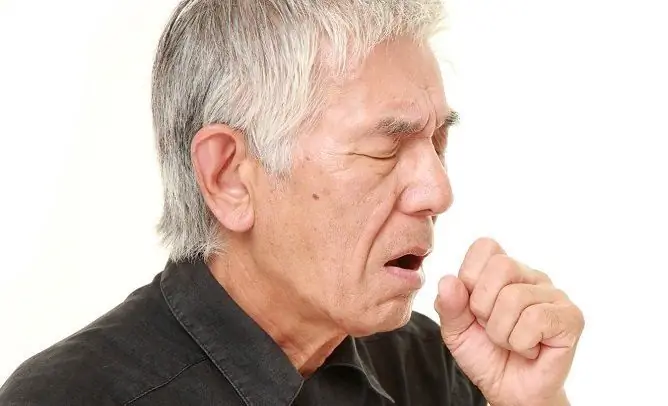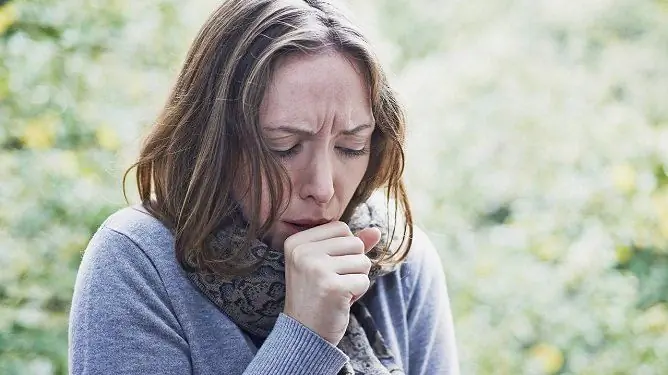- Author Rachel Wainwright wainwright@abchealthonline.com.
- Public 2024-01-15 19:51.
- Last modified 2025-11-02 20:14.
Persistent cough in adults: causes, treatment
The content of the article:
- Causes of persistent cough
- Signs of a prolonged cough and accompanying symptoms
- How to treat a cough that lasts a long time
- Treatment of persistent cough at home with folk remedies
- Video
A persistent cough in an adult can occur not only with diseases of the respiratory tract, but also with disorders from other organs and systems of the body.
After that, therapy is prescribed, which can be carried out in a hospital, but more often it is carried out at home under the supervision of a doctor.

A persistent cough is a serious symptom that requires at least an examination
Causes of persistent cough
Common causes of a long-term cough in a patient include:
- chronic inflammatory processes in the upper and lower respiratory tract;
- bronchiectasis;
- an allergic reaction to an inhaled (more often) or food (less often) irritant;
- bronchial asthma;
- diseases of the gastrointestinal tract (chronic gastritis with high acidity, gastroesophageal reflux disease, etc.);
- severe pathologies of the cardiovascular system;
- malignant neoplasms of the respiratory system;
- tuberculosis;
- systemic lupus erythematosus;
- sarcoidosis;
- taking certain medications.
Persistent cough can be observed in patients with otolaryngological pathologies. So, if a person has chronic rhinitis, sinusitis, curvature of the nasal septum, mucus often flows down the back of the pharynx, which provokes the development of a cough reflex.
In addition, adults have a persistent cough of psychosomatic origin. This type of cough develops in the absence of any organic cause. Excessive mental stress, stressful situations, anxiety can cause the onset of a symptom. Usually it is short-lived, but in case of prolonged stress it may not go away for a long time.
Signs of a prolonged cough and accompanying symptoms
| Disease / condition | Cough and related symptoms |
| Chronic pharyngitis | Dry cough, may be accompanied by tickling, scratching and / or sore throat, worse at night in dry weather. The patient's body temperature is within normal limits. |
| Chronic laryngitis | The patient is tormented by a constant dry hacking cough. Also, with this disease, a change in voice can be observed, when coughing, viscous sputum can be separated. |
| Chronic tracheitis and bronchitis | The cough may be accompanied by chest pain. |
| Allergy |
Dry, irritating cough. In the case of sputum separation, it is transparent and does not contain impurities. Not accompanied by an increase in body temperature. There may also be a rash on the skin, itching, redness of the eyes, watery eyes, nasal discharge, sneezing. |
| Bronchial asthma | The cough can develop into attacks of suffocation. After a coughing attack, viscous (vitreous) sputum may come out. The cough is aggravated at night, after physical exertion, when exposed to external stimuli (smoke, strong smell of perfumery or household chemicals, etc.). |
| Cancer of the larynx, trachea, bronchi, or lung | The cough lasts more than a month (if a person does not have colds or other diseases, allergies), there is blood in the sputum. The patient may lose weight in the absence of changes in the usual diet, regional lymph nodes increase, voice changes are noted, weakness, increased drowsiness and fatigue are observed. |
| Pulmonary tuberculosis | The agonizing cough is accompanied by a discharge of viscous sputum, in which blood can be found. The patient has a decrease in body weight, night sweats, chills. |
| Sarcoidosis | Painful sensations in the chest, swollen lymph nodes, fatigue. |
| Gastroesophageal reflux disease | The cough develops 20-30 minutes after eating, may be accompanied by heartburn, sour belching, unpleasant taste and odor from the mouth, bloating, nausea and vomiting. |
| Taking antihypertensive drugs | Sore throat, constant dry coughing. |
How to treat a cough that lasts a long time
Treatment depends on what is causing the cough. For different pathologies, different treatments are prescribed.
| Pathology | Treatment |
| Allergy | First of all, it is necessary to minimize the patient's contact with the causative allergen. Patients with allergies may be prescribed antihistamines, hormonal anti-inflammatory drugs. |
| Infectious diseases | Antimicrobial drugs, mucolytic, expectorant drugs that dilute stubborn phlegm and improve its excretion from the respiratory tract, respectively. Inhalation with medicinal substances using a nebulizer helps well. |
| Psychosomatic cough | Sedatives, work with a psychologist, psychotherapist may be required. |
| Bronchospasm | Bronchodilators. |
| Defects in the structure of the nose | Surgery. |
| Malignant neoplasms of the respiratory tract | Treatment depends on the type and stage of the tumor. Surgical treatment, chemotherapy, radiation can be used. |
| Tuberculosis | Anti-tuberculosis chemotherapy. |
| Gastroesophageal reflux disease |
Diet is required. Fried, salty, spicy foods, alcoholic beverages, baked goods, sweets should be excluded from the diet. Patients are shown fractional meals (4-5 times a day) in small portions. Prescribed drugs that stimulate intestinal motility, proton pump inhibitors, antacids, antisecretory drugs. |
| Medication-induced cough | Dose adjustment or drug replacement (after consultation with your doctor). |
Sarcoidosis can self-regress within a year.
One of the prerequisites for getting rid of a persistent cough is quitting smoking and improving your lifestyle.

Home treatment should be supervised
Treatment of persistent cough at home with folk remedies
With a prolonged cough, you can, in addition to the main therapy, use traditional medicine, but this should be done only under the supervision of a doctor. Why?
- Steam inhalation with herbal infusion. To prepare the infusion, peppermint, plantain, oregano, coltsfoot, marsh rosemary, eucalyptus, St. John's wort (1 teaspoon each) pour 1.2 liters of boiling water and leave for about 40 minutes. Then the cooled solution is heated to 65 ° C and inhalation is carried out. Steam inhalation is not used in children, as well as in adults with elevated body temperature, allergies and bronchial asthma.
- Carrot and milk product. Small carrots are boiled until soft in 150 ml of milk. The liquid is filtered and allowed to cool. The broth is drunk several times a day.
- Infusion of mother and stepmother. For its preparation, 1 teaspoon of dry raw materials is poured with 1 glass of boiling water. The liquids are allowed to cool, filtered and taken as tea, adding honey (1 teaspoon per 1 glass of infusion).
- A mixture of black radish juice and honey. The black radish is grated, squeezed through cheesecloth (you can get juice with a juicer) and mixed in equal amounts with natural honey. Adult patients are given 1 tablespoon 3-4 times a day.
- Aloe and honey remedy. Chopped aloe pulp is mixed with honey in a 1: 1 ratio. Freshly prepared mixture is taken 1 tablespoon 3 times a day.
- Infusion of marshmallow root. For its preparation, 1 teaspoon of the plant is poured with 1 glass of boiling water. The remedy is consumed in 1-2 glasses a day as a tea.
- Infusion of elecampane. 2 teaspoons of herbs are brewed with 300 ml of boiling water. The product is consumed in 0.5 cups 3 times a day instead of tea 1 hour before meals.
- Rubbing the breast with a mixture of minced garlic and pork fat (mix in a 1: 2 ratio). It is advisable to carry out the procedure before bedtime.
Video
We offer for viewing a video on the topic of the article.

Anna Aksenova Medical journalist About the author
Education: 2004-2007 "First Kiev Medical College" specialty "Laboratory Diagnostics".
Found a mistake in the text? Select it and press Ctrl + Enter.






